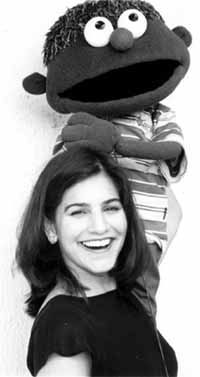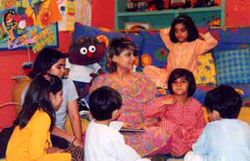From Pakistani Television for Children to the Afghan Children's Project
Sophia Ali just received her master's degree in Developmental Psychology and is off, once again, this time armed with the credentials to produce another television and radio show for children.
Ali, who spent the last 14 years of her professional career in Los Angeles as a film and television producer for Orion, Paramount, and Universal studios, made a life changing decision in 1998. She decided to go back to her native country, Pakistan, to produce something new-a half-hour television show for children, the most neglected segment of Pakistan's television's target audience. By 1999 she had raised funding for the show and in May of 2000, produced the first episode.
Her return to Pakistan was inspired by a friend. "Several years ago a very close friend of mine passed away and I realized that I had to do something important with my life," said Ali. I thought of doing a literacy show for children, something like Sesame Street, but Pakistan-specific."
"I used all my money on building and designing a set full of books, puzzles, toys, and the Urdu alphabet on the walls. Everybody worked for free, and we shot a pilot called Kahani Corner (Story Corner). We started sending it around, and by sheer accident, somebody saw it. It was an organization called the Human Rights Education Program (HREP). The organization decided to fund the program on a one-time basis, hoping that we would then get support from local advertisers for another season," said Ali.
Kahani Corner was aimed at pre-school and primary school children. Each episode had two story telling sessions in Urdu, the language of Pakistan. In the first half, the host Marina Khan and Cheeko, the wise resident puppet of the show, started a discussion on the day's story with the children. In the second half of the show, "star power" was used to encourage parents to watch the program with their children. A Pakistani celebrity guest, for example a soap opera star, read a story, followed by a discussion on what was learned from the stories.
It wasn't an easy concept sell to Pakistani producers. Ali wanted to reach the largest possible audience of Pakistani children but learned quickly that the large satellite conglomerates were not interested in television for children. Their answer to Ali was, "children have no buying power." Ali was finally convinced that PTV, Pakistani Television, the government run station, with one channel, was the best means to reach the "Awam," the mass of Pakistani children who may not be going to school on a regular basis and have no access to high technology.
Ali said it was nerve racking when every show of Kahani Corner went on the air because she was fearful of the Pakistani censors. "But I guess they just thought it was a kids' show and whoever was monitoring the show ignored it and we got away with a lot. We were doing what is considered subversive, for example giving young girls, who have little say in Pakistani society, equal weight on the show with young boys. When we edited we made sure that there were as many girls speaking as boys."
Ultimately, Ali realized it was very difficult to teach reading and changed the goal of the show to combat what she called, "group think." Ali said, "We wanted the children to take the information, process it, and then come up with some of their own ideas. We translated a wonderful book called Eleanor the Elephant, in which the elephant is a patchwork of color while everyone else is gray. We wanted to celebrate the ethnic variety that makes up Pakistan."
But after she produced 13 half-hour episodes of Kahani Corner, which drew rave reviews from parents and children alike, the show was cancelled because Pakistani television moguls had insisted that a children's show was not marketable.
Ali is now back in the U.S., this time working on her degree in developmental psychology and looking forward to working on behalf of the Afghan refugees, mostly children in Pakistan and those Afghan children returning to their devastated land. For her research practicum with Suniya Luthar, Associate Professor of Psychology and Education, Ali went back to Hayatabad, a town located on the outskirts of Peshawar, 40 miles from the Afghan border, to gather data for her paper, "A Description of Depression and Anxiety Levels in Six Afghan Refugee Children." The results of the study were dramatic. The Afghan children were found to have higher anxiety levels than Croatian children and higher depression levels than Bosnian children. There was also a higher degree of suicidal tendencies.
Armed with her degree and her basic research, Ali intends to produce a radio show for the children in the refugee camps and perhaps even build a mobile unit with a television and a VCR to visit villages. Ali is now looking for funding and will be taking the idea around to several foundations.
"This time we have a track record. I believe that a degree from Teachers College is going to make a huge difference between our last experience and this one. I'm not just a television producer but rather I have a knowledge base that will improve my chances of success. The question is, ‘How will it become self-sustaining?'"
Published Thursday, Jul. 11, 2002

